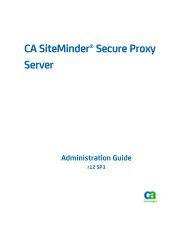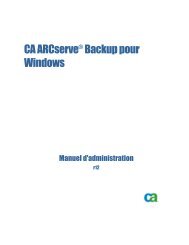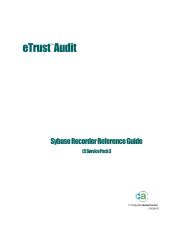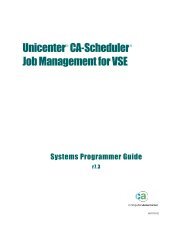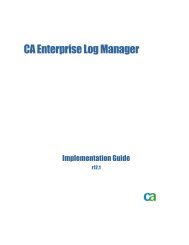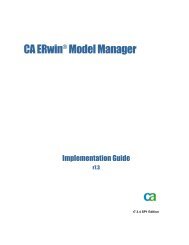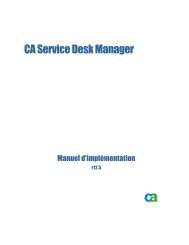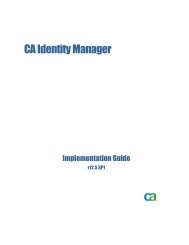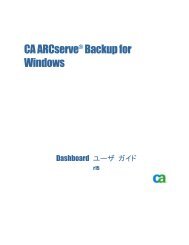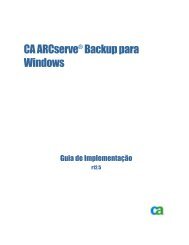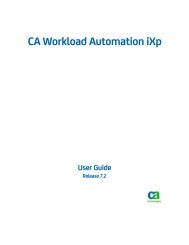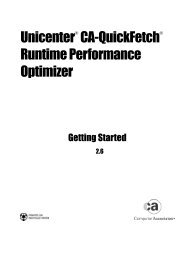Unicenter CA-Scheduler Job Management for VSE User Guide
Unicenter CA-Scheduler Job Management for VSE User Guide
Unicenter CA-Scheduler Job Management for VSE User Guide
You also want an ePaper? Increase the reach of your titles
YUMPU automatically turns print PDFs into web optimized ePapers that Google loves.
3.2 Defining Optional Schedule Records<br />
The preceding panel shows different values defined <strong>for</strong> two fields. How does<br />
this relate to the criteria statement SCD DBUPDATE OR DAILY?<br />
■<br />
■<br />
On days when DBUPDATE runs, the backup schedule can begin any time<br />
after 2200 (10 p.m.) and should take no more than one hour to run.<br />
On other days, you might run fewer backup jobs, so the schedule can start<br />
later (no earlier than 11 p.m.) and should only take 30 minutes.<br />
Be<strong>for</strong>e you actually create this reason code record, examine all five fields on<br />
this panel.<br />
AVG TIME allows you to give simulation more precise average processing<br />
times <strong>for</strong> this schedule. The fields here correspond to different reasons why the<br />
schedule is selected. If you do not specify AVG TIME <strong>for</strong> the reason why the<br />
schedule was selected, simulation uses AVERAGE TIME on the schedule base<br />
record. If that field is also blank, simulation uses the actual average processing<br />
time <strong>for</strong> this schedule derived from historical data.<br />
EARLY TIME allows you to specify different start times <strong>for</strong> each reason a<br />
schedule is selected. If you leave these fields blank, <strong>Unicenter</strong> <strong>CA</strong>-<strong>Scheduler</strong><br />
uses the value on the schedule base record every time the schedule is selected.<br />
These values override EARLIEST START TIME on the schedule base record.<br />
MUST TIMEs tell <strong>Unicenter</strong> <strong>CA</strong>-<strong>Scheduler</strong> to issue late messages at different<br />
times <strong>for</strong> each reason schedules are selected. Suppose the backup schedule was<br />
selected today <strong>for</strong> the second reason: DAILY. Then <strong>Unicenter</strong> <strong>CA</strong>-<strong>Scheduler</strong><br />
will issue a late message if the backup schedule has not started by the time<br />
specified in the second MUST TIME field. These values override MUST<br />
START BY TIME on the schedule base record.<br />
DEADLINE TIMEs tell <strong>Unicenter</strong> <strong>CA</strong>-<strong>Scheduler</strong> to issue late messages if this<br />
schedule is not finished by the deadline specified. Specify values here if you<br />
want to define different deadlines <strong>for</strong> each reason the schedule was selected.<br />
These values override the COMPLETION DEADLINE TIME you may have<br />
specified on the schedule base record.<br />
MAXIMUM TIMEs set limits on how long a schedule should run. If schedules<br />
take longer, <strong>Unicenter</strong> <strong>CA</strong>-<strong>Scheduler</strong> will issue a late message. Specify values<br />
here if you want to define different durations <strong>for</strong> each reason the schedule was<br />
selected. These values override the MAXIMUM EXECUTION TIME specified<br />
on the schedule base record.<br />
Now that you are familiar with these fields, finish creating the reason code<br />
record. After you have finished filling fields on the panel, press Enter.<br />
<strong>Unicenter</strong> <strong>CA</strong>-<strong>Scheduler</strong> immediately sends this in<strong>for</strong>mation to the database<br />
and confirms this with the message:<br />
Chapter 3. Maintaining the Database 3-25



